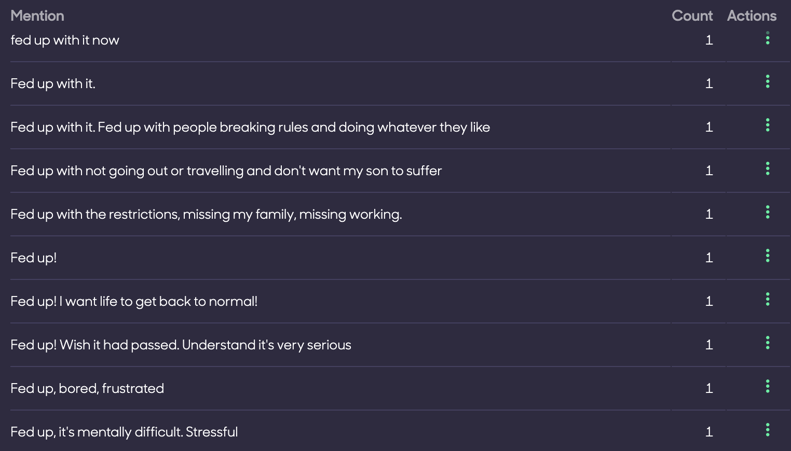Posted on March 12, 2021
Updated on March 13, 2023
4 min read time

The all-too familiar, ‘Winter Blues’, happen every year, around the month of January. It’s when the world starts to slow. The Christmas Buzz has died down and for those of us in the Northern Hemisphere, cold, dark, winter months lay ahead.
This phenomenon doesn’t just affect individuals, it can also affect brands. If you’ve ever experienced a drop in metrics or a lull in your campaign performance at this time of year, it could be due to the winter blues.
Successful Brand Managers are keen observers, adept at identifying any external threats that could impact their campaigns or affect how people feel about their brand. These threats could be as minor as having too many rainy days in August, or as severe as COVID-19.
Seasonality is when external factors affect regular purchasing behaviour. We see this every summer with barbecues. On a sunny day, supermarkets are mobbed with buyers wanting to acquire coals and barbecue meats. Why is this the case? Because of seasonality. We associate summer days with barbecues through our learned experiences.
Seasonality has an impact on revenue and buying patterns. Summer brands know to expect a slow January, February and March, but have learned as soon as the weather picks up, their sales will increase.
Usually with seasonality, you can predict how patterns will flow, but when something unexpected happens, like COVID-19, these patterns become disrupted. This year, non-seasonal brands like hand sanitizer experienced mass demand and were suddenly out of stock. Whereas usually popular, aviation brands, saw rapid declines in revenue, as their airplanes were grounded for months at a time. This can be incredibly problematic for brands that are dependent on seasonality for sales.
Many of the brands on our platform experienced seasonality to some degree between December 2020 and January 2021. This wasn’t a category specific occurrence but is a trend we’ve seen across markets and industries.
Our ProQuo Score is the single, simple indicator of the strength of a brand’s relationship with people, generated by capturing people’s feelings about brands across the 16 Drivers of relationships. Their answers are timed to understand the strength of the consumer’s feelings. Declining scores are caused by more people disagreeing that a brand possesses these Drivers, or by people feeling less wholeheartedly positive in their responses.
It’s common to see declining scores in January, as the post-holiday blues can leave people feeling lacklustre. This year, these feelings have been heightened by an ongoing frustration with the pandemic. In December, the main themes in our COVID-19 Impact Reports were centered around being “worried”, “scared”, “concerned” or “anxious”. By January, we saw more references to being “bored” and “fed up”.

Specifically, people were tired of being trapped at home and the way their own governments were handling the virus. These feelings, on top of the normal despondencies we see in January, are creating drops in the performance of many categories.
Brands which have bucked this trend and grown their ProQuo Scores in January tend to be building off accelerated brand momentum from late November and December. This shows it’s not always a certainty that brands will decline at this time of year, but it does convey the importance of a more sustained marketing effort in driving change at this time of year.
Focusing on seasonality is important because it helps you to understand the mindset of the people you are marketing to. But it’s also key to acknowledge that success in months like January may look very different to other times of the year.
If you’ve launched marketing activity in the New Year, here are some tips for how to approach your brand in ProQuo:
Look at your year-on-year performance. If your account is more than a year old, consider using a year-on-year comparison of your ProQuo Scores and key Drivers to understand your 'normal' positioning at this time of year.
Report using relative scores, rather than absolute ones. We’ve seen several instances where great performance actually means maintaining your December scores, while other brands in your category decline. When reporting to stakeholders, look at how much further ahead or closer behind the competition you are.
Dig into People and Drivers. Think carefully about who you were targeting with your marketing activity and what it was you were trying to achieve. Your brand scores might be declining overall, but you may be seeing positive movements among certain types of people or certain Drivers.
Log events. Within the platform, log milestones related to your brand’s marketing activity AND external events, such as key announcements and milestones related to the COVID-19 pandemic. This will help you more clearly understand the timings of brand movements in your account.
Add commercial data to understand the interplay between people’s feelings and your business results. Adding commercial data sets into the platform can help you understand how peoples’ feelings toward your brand normally correlate with your commercial outcomes. In a lot of instances, ProQuo Scores pre-empt positive commercial performance. A peak in your ProQuo Score in December could be mapped to a peak in sales for January.
Hold your nerve! Several brands who were declining in January are starting to see their scores rocket as a feeling of optimism, combined with sustained brand and marketing activity in January, start to take hold.
To guarantee marketing success during periods of intense seasonality, focus in on your competition and category, identifying areas where consumer needs are not being met. Find out what is missing in the category to ensure your product or service adds maximum value to your target audience.
The most important thing to consider when launching a new product or campaign during a period of intense seasonality is to make sure your data is as current as possible. Campaigns that are based on outdated sources can dent a brand’s credibility or reputation. Ensuring your finger is always on the pulse of the latest trends in your category will help you to generate the greatest impact with your activities. This is why always-on analysis is so crucial.
Don’t take the risk, get on board now with ProQuo’s real-time analysis brand management platform.
Our intelligent platform will take your brand further, faster.
Don’t believe us?
© 2020-2023 ProQuo AI International
All rights reservedWebsite by Blend